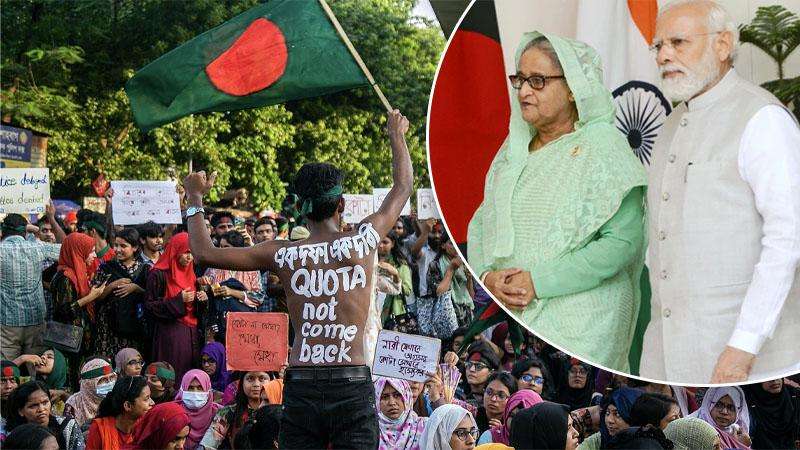India that got heavy shock after former Prime Minister of Bangladesh Sheikh Hasina quit the power on August 5, 2024 following strong student protest over her dictatorial rule, misrule, massive corruption and poor governance will gradually come to reality and start working with new interim government of Bangladesh, headed by Nobel Laureate Professor Mohammad Yunus, to prosper together as closed neighbours, said senior diplomats, top business leaders and policy makers.
Sheikh Hasina -- the brutal dictator and last Prime Minister of Bangladesh, who ruled Bangladesh for 15-year plus-- had to quit power on August 5, 2024.
The regime of Sheikh Hasina that lasted from January, 2009 to August 5, 2024, was the darkest period in the history of the country.
Former Bangladesh Ambassador to the USA and career diplomat M Humayun Kabir while talking to this correspondent said that Dhaka and New Delhi relations will gradually become normal as Indian External Affairs Minister S Jaishankar has hinted that the Indian government will work with the incumbent government of Bangladesh.
He also said that the present government took some necessary steps that have reduced Indian tension on certain issues like protection of minorities and Indian businesses and establishments, and positive mindset of the incumbent government to manitian Dhaka and New Delhi relations on mutual respect and benefit.
He clearly stated that the student movement in Bangladesh was against the misrule of the past Awami League government, not against the India government and people.
Humayun Kabir, also president of Bangladesh Enterprise Institute (BEI), a local thingtank, has expressed the hope that New Delhi will work on improving the people-to- people relations and government –to-government level to restore normal relations and reach the relations to the expectations of both countries.
He said that leaders of the student movement never uttered derogatory statements against the India government and the people, this movement is against Sheikh Hasina, her party and misdeeds.
He said as part of initial steps, the high commissioner of India in Bangladesh will start issuing tourist visas to Bangladeshis and businesses that suffered heavily will get back on track.
Bangladeshi tourist arrivals in India in 2023 posted over 60 per cent growth the previous year 2022 as some 20,56,880 Bangladeshi tourists visited the neighboring country in 2023 as compared to some 12,55,960 Bangladeshi tourists in 2022
During the months of July and August, Bangladesh tourist arrival in India recorded the lowest level in recent times as the country passed through political turmoil during July 1-August 5, 2024.
Usually over 150,000 Bangladeshi tourists visit the neighboring country every month.
Bangladeshi tourists (22.27 per cent) also retained the top position in neighbouring India during the January-December period of 2023, followed by the United States (17.79 per cent), the UK (9.68 per cent), Canada (9.68 per cent) and Australia (4.05 per cent, according to the data of the Tourism Ministry of the government of India.
Foreign tourists arrivals (FTA) during the period of January- December, 2023 were 92,36,108 as compared to 64,37,467 in January-December 2022 and 1,09,30,355 in January-December, 2019 registering a growth of 43.5% and -15.5% with respect to 2022 and 2019 respectively.
Besides tourists, several thousand Bangladeshi students are pursuing higher education, in elementary schools and several lakh to get better treatment in different part of India
India’s inbound tourism sector is experiencing a significant rebound, with foreign tourist arrivals (FTAs) in 2023 surging 64 per cent compared with 2022. This translates to 92,36,108 visitors between January and December 2023, compared with 64,37,467 in the same period of the previous year. However, despite this impressive growth, the sector remains 15.5 per cent below pre-pandemic levels recorded in 2019, according to the Ministry of Tourism’s data.
A former senior Bangladesh diplomat who was posted in Washington DC said while talking to this correspondent said “ India will possibly be less than cooperative but refrain from open hostility for the time being. With the passage of time, India would gradually accept the reality and extend cooperation.” In any event, India will always disturb us,’ he feared.
Meanwhile, referring to changes in Bangladesh, Indian External Affairs Minister S Jaishankar on Friday said they will deal with the government of the day.
"It is natural that we will deal with the government of the day," he said.
He said they have to recognise that there are political changes, and political changes can be disruptive.
"And clearly here, we have to look for mutuality of interest," Jaishankar said.
He spoke at the Book release of "Strategic Conundrums: Reshaping India's Foreign Policy authored by Rajiv Sikri.
Jaishankar said everyone is aware that since Bangladesh's independence, the relationship between the two countries have gone up and down
Meanwhile, Transport and Tourism Minister of India's Tripura state, Sushanta Chowdhury, has said that no matter which government comes and goes in Bangladesh, the leaders are trying to prevent disruption in bilateral and diplomatic relations between India and its neighbouring country.
"Our prime minister Narendra Modi is trying, and I hope the Chief Adviser of Bangladesh Dr Muhammad Yunus will do so too," said Sushanta at a press briefing at Mahakaran in Tripura's Agartala last evening (31 August).
He said the Indian government will continue its efforts to introduce direct flights between Agartala and Chattogram, given the current circumstances in Bangladesh.
The Business Standard Google News Keep updated, follow The Business Standard's Google news channel
"We strongly believe that our relations with Bangladesh will improve, although it's still early to comment on this matter. We are taking advance preparations and hope that the Agartala-Chattogram flights will begin soon," Sushanta said.
Local journalists and government officials were present at the press briefing.
Meanwhile,Radhika Pandey, Associate Professor and Rachna Sharma, Fellow at National Institute of Public Finance and Policy (NIPFP) in India, said that “
Bangladesh is India’s largest trading partner in South Asia. It is a major market for India’s textile and agricultural exports. Bangladesh has been grappling with high inflation and unemployment among the youth, which has led to slackness in import demand, particularly that of non-textile items. The persistent dollar crisis has exacerbated external vulnerability. The ongoing disruption could further complicate the situation.
The exports of agricultural products could take an immediate hit as the Kharif harvest is around the corner. The unrest could also cast uncertainty over the potential free trade agreement talks, affecting investment.
Meanwhile,Radhika Pandey and Rachna Sharma also said “ India’s trade with Bangladesh has traditionally been characterised by strong export performance leading to a trade surplus. Exports to Bangladesh rose from USD 3.2 billion in 2010-11 to a peak of USD 16.2 billion in 2021-22.
The last two years saw a moderation in exports. In the last financial year, exports to Bangladesh were valued at USD 11 billion. The decline is partially attributable to a decline in exports of agricultural products, owing to export restrictions on rice, wheat and sugar to rein in domestic prices. Dollar shortage and rising inflation in Bangladesh also led to lower demand for exports.
In 2021-22, Bangladesh was India’s fourth largest export market. It slipped to the eighth position in FY 24 due to decline in outbound shipments.
Imports from Bangladesh remained in the range of USD 0.4 billion to USD 0.7 billion from 2010-11 till 2017-18. Imports crossed USD 1 billion in 2018-19 and peaked at USD 2 billion in 2022-23. Last financial year saw a moderation in imports to USD 1.8 billion.
India exports a diverse set of commodities to the neighbouring country, ranging from raw cotton, spices, textiles, machinery, transport equipment and metals. Looking at the broad categories, manufactured goods and agriculture and allied products together accounted for more than 75 percent of exports to Bangladesh in 2023-24. Of this, agriculture and allied products accounted for 22 percent of the exports, a decline from 34.2 percent in 2021-22.
Raw cotton (including waste), oilmeals and spices are the top three exports in the agriculture and allied products category. Bangladesh is the main destination for India’s cotton exports. Over half of India’s raw cotton exports of USD 1.2 billion is accounted for by Bangladesh. Bangladesh is also India’s top importer of oilmeals, accounting for almost 24 percent of India’s exports of oilmeals. After China and the USA, Bangladesh is the third largest export destination for spices. The unrest in Bangladesh has brought these exports to a standstill.
Manufactured goods accounted for 55 percent of India’s exports to Bangladesh in 2023-24. Textiles (excluding readymade garments), engineering goods, and chemical and related products, are the major exports within the manufacturing basket.
Exports of textiles (excluding readymade) garments account for 20 percent of India’s exports to Bangladesh. The importance of Bangladesh as a market for textile can be gauged from the fact that since 2016-17, Bangladesh has the second largest share in India’s exports of textiles (excluding readymade garments), next only to the USA.
Bangladesh has occupied a pivotal position as an exporter for readymade garments, in the aftermath of the China plus one strategy. Readymade garments now account for around 85 percent of Bangladesh’s exports. The country relies on imports of raw materials, such as yarn and fabrics, from India and China.
Surat is a major exporter of products, such as sarees and fabrics to Bangladesh. Due to the current disruption, the textile and yarn business in Surat has been hit as there are no new orders and payments are also stuck. Sales ahead of the festive season may be impacted if the ongoing crisis persists for long.
Engineering goods account for 19 percent of India’s exports to Bangladesh. The turmoil in Bangladesh could exacerbate the already weakening demand for India’s engineering goods exports. India’s exports of engineering goods have been in slow lane due to the weak demand in advanced economies.
In the last two years, Bangladesh has seen a reduction in the demand for machinery, and industrial raw materials due to the challenging economic landscape. The current situation could constrain their import demand and impact exports of engineering goods. Exports of chemicals, which account for another 10 percent of India’s exports, have also seen a contraction in the last two years.
The inbound shipments from Bangladesh are concentrated towards readymade garments, which account for 32 percent of imports. Jute, both raw and manufactured, marine products, spices and transport equipment are some of the other items of import from Bangladesh.
While Bangladesh has a miniscule share in global merchandise exports, it is the world’s second largest exporter of textiles, with knitted and non-knitted apparels making up 85 percent of its export basket.
Many argue that the advantage Bangladesh has in terms of duty free access to EU and other nations because of its Least Developed Country status, gives it the edge, but the country’s competitive labour cost and the ability to specialise in bulk production and access to cheap imports of raw materials from China have also contributed in cementing its position as a major supplier of readymade garments. Germany, US and UK are major importers of Bangladesh’s knitted and non-knitted apparel.
Disruptions and unrest are likely to lead to delays in supply of textiles and supply chain uncertainties, compelling importers to seek alternative markets. If the uncertainty persists, a potential diversification away from Bangladesh to suppliers offering a more stable environment could benefit countries like Vietnam, Cambodia and India.
While India can potentially benefit from the turmoil, it needs to put forth effective strategies to improve its footprint in textile trade. As the Economic Survey mentions, over 80 percent of the textile and apparel producers are MSMEs, where the benefits from economies of scale and efficiency are limited.
In addition to technological constraints and the fragmented nature of the sector, the composition of exports of readymade garments also need a relook. Diversification towards readymade garments of manmade fibres and speciality garments, which are in greater demand in global markets, will help improve India’s prospects of becoming a preferred supplier of garments.
Meanwhile, the Indian government recently rejected a CNN report that blamed India for the recent floods in Bangladesh, saying the report’s narrative is “misleading” and “factually not correct.”
At a media briefing here, Ministry of External Affairs spokesperson Randhir Jaiswal said, “We have seen the CNN report on the flood situation in Bangladesh. Its narrative is misleading and suggests that India is somehow responsible for the floods. This is factually not correct and ignores the facts mentioned in the press releases issued by the Government of India clarifying the situation.”
He said the report has also ignored the fact that the two countries have a regular and timely exchange of data and critical information through existing joint mechanisms for water resources management.
The CNN had stated, “Dozens of people CNN met in Feni – which is only a few miles from the India border – accused New Delhi of releasing water from the Dumbur dam in neighbouring Tripura state with no warning.
India denied the dam release was deliberate and said excessive rain was a factor. The government said that a power outage and communications breakdown meant they were unable to issue the usual warning to its neighbour’s downstream.
Meanwhile, highlighting the importance of a workable relations with India, South Asian affairs expert Michael Kugelman has said the interim government in Bangladesh will need to be “very careful” about how it pursues its relations with New Delhi.
“I think that we need to be very clear. At least in my view, Bangladesh cannot afford to lose India. It needs that partnership for reasons of trade, border security and geopolitics,” Kugelman, Director of the South Asia Institute at Wilson Center in Washington, D.C. said in a webinar hosted by Right to Freedom - R2.
He thinks it really needs to maintain “workable relations” with India, not necessarily “super warm” relations.
Kugelman also thinks India's own interests dictate a workable relationship with Bangladesh.
It is going to need to take care not to do anything that could further inflame the existing anti-India sentiment.
“And this is why I think it should combine its outreach to India with a principled stand against any attempts by India to meddle or try to meddle or exert outsized influence,” said the expert.
Kugelman put forward three suggestions to the interim government including to engage with New Delhi.
Interim government Chief Adviser Prof Yunus will likely meet with Indian Prime Minister Narendra Modi during the 79th UNGA meetings assuming that they both will be there.
Kugelman said it is perhaps Bangladesh's most complex foreign relationship (with India) right now and it is one of the only countries and certainly it’s the only close friend that “has not rushed to embrace or at least welcome” the new government.
He said there had been a brief engagement and a call between Prof Yunus and Narendra Modi.
Second, there are some steps that Dhaka can take that would advance its own interests, particularly its security interests, but would also address some of India's concerns, said the expert.
And third, he said, “Don't unthinkingly succumb to the temptations of populism. There is, as we all know, extensive levels of anti-India sentiment in Bangladesh. One can understand why.”
Very recently, he said, there was a fuelled speculation that India opened up a dam that helped to precipitate the recent floods in Bangladesh.
“And Nahid Islam, one of the top student protest leaders and now a member of the interim government holding a minister status, repeated those allegations, even though there's no indication that actually is true,”Kugelman said.
He said Bangladesh's domestic situation and its domestic policy priorities are very much linked to its foreign policy right now.
Kugelman mentioned how the law and order situation and political uncertainty in Bangladesh could impact the perceptions and potentially the actions of foreign governments and foreign investors.
Right to Freedom Board Member Jon Danilowicz moderated the webinar while Right to Freedom Executive Director Mushfiqul Fazal Ansarey gave a brief introduction of the panel of speakers and Ambassador (retd) William B Milam, Board President of the R2F offered opening remarks.
Executive Director, Centre for Policy Dialogue (CPD) Dr Fahmida Khatun and Secretary, Citizens for Good Governance Dr Badiul Alam Mazumdar spoke at the webinar which aimed to foster conversations on critical aspects of Bangladesh’s new journey under the leadership of Nobel Laureate Professor Muhammad Yunus.








.svg)


